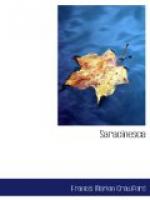Corona found it impossible to leave town so soon as she had wished. She had indeed sent out great cart-loads of furniture, servants, horses, and all the paraphernalia of an establishment in the country, and she believed herself ready to move at once, when she received an exceedingly courteous note from Cardinal Antonelli requesting the honour of being received by her the next day at twelve o’clock. It was impossible to refuse, and to her great annoyance she was obliged to postpone her departure another twenty-four hours. She guessed that the great man was the bearer of some message from the Holy Father himself; and in her present frame of mind, such words of comfort could not fail to be acceptable from one whom she reverenced and loved, as all who knew Pius IX. did sincerely revere and love him. She did not like the Cardinal, it is true; but she did not confound the ambassador with him who sent the embassy. The Cardinal was a most courteous and accomplished man of the world, and Corona could not easily have explained the aversion she felt for him. It is very likely that if she could have understood the part he was sustaining in the great European struggle of those days, she would have accorded him at least the admiration he deserved as a statesman. He had his faults, and they were faults little becoming a cardinal of the Holy Roman Church. But few are willing to consider that, though a cardinal, he was not a priest—that he was practically a layman who, by his own unaided genius, had attained to great power, and that those faults which have been charged against him with such virulence would have passed, nay, actually pass, unnoticed and uncensured in many a great statesman of those days and of these. He was a brave man, who fought a desperate and hopeless fight to his last breath, and who fought almost alone—a man most bitterly hated by many, at whose death many rejoiced loudly and few mourned; and to the shame of many be it said, that his most obstinate adversaries, those who unsparingly heaped abuse upon him during his lifetime, and most unseemingly exulted over his end, were the very men among whom he should have found the most willing supporters and the firmest friends. But in 1865 he was feared, and those who reckoned without him in the game of politics reckoned badly.
Corona was a woman, and very young. She had not the knowledge or the experience to understand his value, and she had taken a personal dislike to him when she first appeared in society. He was too smooth for her; she thought him false. She preferred a rougher type. Her husband, on the other hand, had a boundless admiration for the cardinal-statesman; and perhaps the way in which Astrardente constantly tried to impress his wife with a sense of the great man’s virtues, indirectly contributed to increase her aversion. Nevertheless, when he sent word that he desired to be received by her, she did not hesitate a moment, but expressed her willingness at




